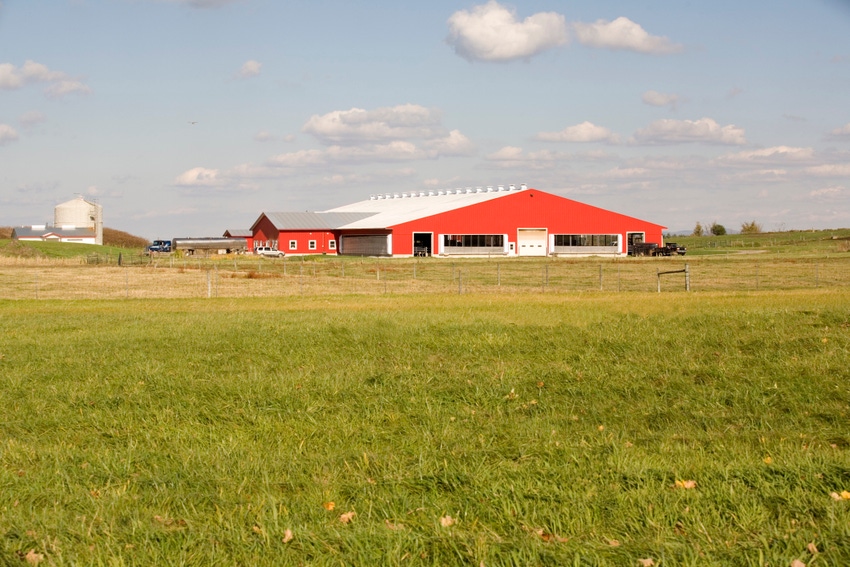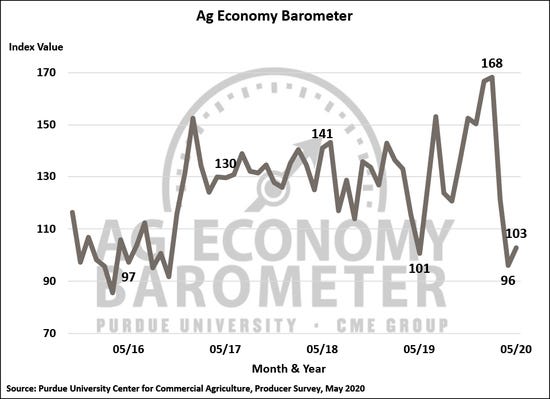More than 70% of respondents worried about impact of COVID-19 on farm’s profitability.
June 2, 2020

Farmer sentiment improved slightly in May after falling sharply in both March and April, according to the Purdue University/CME Group Ag Economy Barometer, which is based on responses from 400 U.S. agricultural producers. The survey, conducted May 18-22, showed a seven-point increase from April, reaching a reading of 103. However, it remained nearly 40% below its all-time high of 168 set in February 2020.

The Index of Current Conditions improved in May, rising 11 points from April to a reading of 83, as did the Index of Future Expectations, up four points to a reading of 112. In May, farmers were also somewhat more inclined to think that now is a good time to make large investments in their farming operations. The Farm Capital Investment Index rose to a reading of 50 from 38 just a month earlier. While all three of these indices improved collectively in May, each was down more than 30% compared to February 2020, before COVID-19 affected markets.
“This month’s survey was conducted the same week that [the U.S. Department of Agriculture] announced the details of the Coronavirus Food Assistance Program (CFAP), so awareness of that program’s details could be one of the key reasons for this month’s barometer improvement,†said James Mintert, the barometer’s principal investigator and director of Purdue University’s Center for Commercial Agriculture. “Yet, some farmers remain worried about their bottom line and are still looking for options to alleviate those concerns.â€
In the May survey, more than 70% of respondents indicated that they were “very worried†(34%) or “fairly worried†(37%) about the impact of COVID-19 on their farm’s profitability, up from 67% in April. Their two biggest concerns were market access (42%) and financial (39%), with health and safety (11%) coming in third. Providing further evidence of their financial concerns, two-thirds of farmers surveyed indicated that they think it will be necessary for Congress to pass another bill to provide more economic assistance to U.S. farmers.
When asked about expectations for their financial position over the next 12 months, more than 60% said they expect farmers’ equity positions to decline over the next year, up sharply compared to 28% of farmers who felt that way in February 2020.
Given the large decline in crop margins this year, the May survey asked farmers who rent farmland if they expect to ask their landlords to reduce their 2021 cash rental rates because of COVID-19. Although two-thirds of farmers who rent farmland said no, 27% of respondents said they do plan to seek a cash rent reduction in 2021. Mintert suggested that this could lead to downward pressure on cash rental rates next year.
Farmers in May were somewhat less pessimistic about the short-run direction of farmland values than a month earlier but continued to have a much more negative view than back in February. In the May survey, 29% of respondents said they expect farmland values to decline in the next 12 months, down from 35% a month earlier. This stands in sharp contrast to the 13% of respondents in February who expected values in the upcoming year to decline.
When asked to provide a longer-term perspective on farmland values, producers’ responses have been relatively consistent from March to May. Over that three-month period, the percentage of farmers expecting farmland values to rise over the next five years ranged from a high of 44% in April to a low of 40% in May, with March coming in at 41%. These values compare to 59% of respondents who expected farmland values to rise over the next five years back in February.
You May Also Like


.png?width=300&auto=webp&quality=80&disable=upscale)
